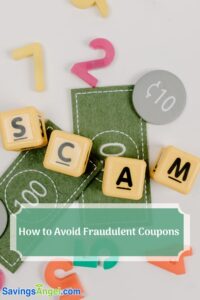How to Avoid Fraudulent Coupons
A new movie ‘Queenpins’ starring Kristen Bell just hit theaters in limited release and will air on Paramount+ September 30th. The film is based on a true story of three women in Arizona who were charged with running a $40 million counterfeit coupon ring.
Coupon fraud isn’t the first thing we think of when we think of theft. It’s hard to imagine that there are laws and jail time involved with using and counterfeiting fraudulent coupons. Nevertheless, it’s actually an offense punishable by law. Here are some ways to protect yourself from using these counterfeit coupons.
Where Did You Find It?
Pay close attention to where you found the coupon. Was it in a mailer, at the grocery store, or on the manufacturer or clearinghouse’s website? Chances are in these cases that they are legitimate coupons that are safe to use.
Coupons to be wary of are the ones on websites unaffiliated with retailers or manufacturers. Some coupon websites are trustworthy, especially if the coupons, deals, and promos lead back to a reliable source. If you can’t find the coupon’s origin on a reliable website, or if the coupon seems too good to be true, that’s a major red flag. Avoid using coupons like this.
Read the Fine Print
As I mentioned before, when a coupon seems too good to be true, it just might be. If you don’t see an item or price maximum, if you’re saving more than half of the cost of the item, and/or if there’s no expiration date, chances are it’s a fraudulent coupon.
Don’t Copy Coupons
This seems small and unassuming, but photocopying coupons is considered coupon fraud and is illegal. Most printed coupons have unique barcodes, meaning if you try to photocopy and reuse them, it won’t work and the cashier will know the coupon has already been used. Even if you don’t think a store will notice, it’s bad shopper etiquette and is definitely fraudulent. Avoid shady coupon “hacks” such as this one; ultimately, they will land you in hot water with the retailers you shop at — and maybe even with the law.
Be Wary of Emailed Coupons
Coupons emailed directly from the manufacturer, clearinghouse, or retailer are safe. However, coupons from friends or other savvy shoppers you know need to be looked at critically. If they offer a “free” item or boast extreme savings, it’s probably not legitimate. Be especially wary of anything that promises a free item that isn’t clearly a legitimate promotion. You usually need to spend money to get a free item during a promotion. These coupons are almost always counterfeit coupons.
No Barcode? Don’t Use It!
If the coupon lacks the essentials, like a barcode, expiration date, or limitations and conditions, it is most certainly not legitimate. A coupon with no barcode is a telltale sign, so be extra vigilant and when in doubt, don’t use it.
When in Doubt, Call
When you aren’t sure if a coupon is legitimate, you can always call the manufacturer and ask if it is. They will definitely be able to tell you if a coupon is valid, even if the coupon was generated through a clearinghouse on the manufacturer’s behalf.
Remember, using fraudulent coupons is illegal. While mistakes and unintentional accidents can happen, it’s up to you to do your due diligence before trying to use coupons. Stay vigilant and look at savings opportunities with a critical eye.


